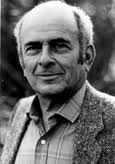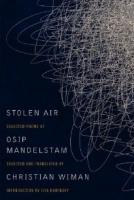March 27, 2012
Edited by David Sanders
Specimen Days
March 27, 2012
1472 – Janus Pannonius, Hungarian poet/translator, dies at 37.
1665 – Benjamin Neukirch, German poet (Herrn von Hofmannswaldau), is born.
1714 – Anton Ulrich, German duke of Brunswick/poet, dies at 80.
1746 – Michael Bruce, Scottish poet (d. 1767), is born.
1883 – Marie Under, Estonian author and poet (d. 1980), is born.
1920 – Johan G Danser, Dutch poet (Meetings), dies at 26.
1923 – Louis Simpson, Jamaican/US poet (Good News of Death), is born.
1966 – Mien Labberton, Dutch poet, dies at 82.
1969 – Pauley Perrette, American actress, photographer, poet, writer, is born.
2006 – Ian Hamilton Finlay, Scottish poet, writer, artist and gardener (b. 1925), dies.
 American Poetry
American Poetry
Whatever it is, it must have
A stomach that can digest
Rubber, coal, uranium, moons, poems.
Like the shark it contains a shoe.
It must swim for miles through the desert
Uttering cries that are almost human.
—Louis Simpson, born 1923
Poetry In The News
Fitting Poetry to the Screen
The same problem persists—e-books and poetry just don’t get along as well as e-books and prose. It’s those line breaks, poetry’s defining feature. The problem is a simple sounding one, but really tough to solve. Because the same e-book has to work on many different screens and devices on which readers can change the font and size of the text, it’s impossible to guarantee the line will display as the poet intended. Read more at Publishers Weekly.
UC Davis Multicultural Poetry Slam an Outlet for Cries and Whispers
 The UC Davis Cross Cultural Center shuddered on a recent Thursday night with the anguished cries and soulful rants of a dozen young poets. More than 100 students laughed, teared up, snapped their fingers in affirmation and nodded at beats and musings of love, heartbreak and misunderstanding. Muslim American women in hijabs poured out their truths alongside a Latina mother of two, black and white poets of both genders and bards of Vietnamese, Chinese, Taiwanese, Hmong, Mien and Cambodian extraction. Read more at the Sacramento Bee.
The UC Davis Cross Cultural Center shuddered on a recent Thursday night with the anguished cries and soulful rants of a dozen young poets. More than 100 students laughed, teared up, snapped their fingers in affirmation and nodded at beats and musings of love, heartbreak and misunderstanding. Muslim American women in hijabs poured out their truths alongside a Latina mother of two, black and white poets of both genders and bards of Vietnamese, Chinese, Taiwanese, Hmong, Mien and Cambodian extraction. Read more at the Sacramento Bee.
World Poetry
Greek Poets Stage Protest in Athens
Controversial, outspoken and talented is probably the best way to describe Zimbabwean poet Mbizo Chirasha. Dubbed as Zimbabwe’s own version of South Africa’s firebrand and “explosive” poet, Mzwake Mbuli —”The People’s Poet” or better still Jamaican bard, Mutabaruka, Mbizo is committed to uplifting poetry in Zimbabwe. Read more at AllAfrica.
The Prosaic Side to an Aalmi Mushaira
It has been more than two decades since the Mushaira was first held, but it seems that not beginning the event until after midnight, having hosts (nazim) who like to speak into the microphone more than the guest poets, and not controlling the non-serious sections of the crowd are traditions that have taken root. At least two Indian poets clearly felt uncomfortable with the crowd’s lack of attention to their recitation and directed a barb or two at those who were busy having a good time as if they were at a music concert. Read more at Dawn.com.
New Books
Pitch: Poems by Todd Boss
[Hardcover] W. W. Norton & Company, 112 pp., $24.95
With poems about loss, home, marriage, and the inner music of our lives, Pitch is a series of variations on an overturned piano. By turns bright and dark like the keys on a keyboard, these poems demonstrate the range of one of contemporary poetry’s most musical poets, a master of internal rhyme.
The Eternal Ones of the Dream: Selected Poems 1990-2010 by James Tate
 [Paperback] Ecco, 272 pp., $19.99
[Paperback] Ecco, 272 pp., $19.99
The Eternal Ones of the Dream features Tate’s work from the last two decades, selected from seven books of poetry. The poems span from 1990’s Distance from Loved Ones to 2009’s The Ghost Soldiers, showcasing the impressive breadth of talent. As W. S. Merwin said of Tate, “Mr. Tate’s gift is such that many of [his] poems move me at least to plain envy of what he can do.”
The FSG Book of Twentieth-Century Italian Poetry: An Anthology edited by Geoffrey Brock
[Hardcover] Farrar, Straus and Giroux, 720 pp., $50.00
After World War II, new generations—including such marvelously diverse poets as Sandro Penna, Pier Paolo Pasolini, Amelia Rosselli, Vittorio Sereni, and Raffaello Baldini—extended the enormous promise of the prewar era into our time. A surprising and illuminating collection, The FSG Book of 20th-Century Italian Poetry invites the reader to examine the works of these and other poets—seventy-five in all—in context and conversation with one another. Edited by the poet and translator Geoffrey Brock, these poems have been beautifully rendered into English by some of our finest English-language poets, including Seamus Heaney, Robert Lowell, Ezra Pound, Paul Muldoon, and many exciting younger voices.
Stolen Air: Selected Poems of Osip Mandelstam edited by Christian Wiman
 [Paperback] Ecco, 128 pp., $15.99
[Paperback] Ecco, 128 pp., $15.99
Stolen Air spans Mandelstam’s entire poetic career, from his early highly formal poems in which he reacted against Russian Symbolism to the poems of anguish and defiant abundance written in exile, when Mandelstam became a truly great poet. Aside from the famous early poems, which have a sharp new vitality in Wiman’s versions, Stolen Air includes large selections from The Moscow Notebooks and The Voronezh Notebooks. Going beyond previous translators who did not try to reproduce Mandelstam’s music, Christian Wiman has captured in English—for the first time—something of Mandelstam’s enticing, turbulent, and utterly heartbreaking sounds.
Recent Reviews
Mashup
The Grey Album riffs on Langston Hughes and Jay-Z, Tiger Woods and Elizabeth Bishop
by Wesley Morris
Where is blackness right now? Is it behind us, beyond us, on top of us? Have we buried it? Is it everywhere? Is it nowhere? A group of youngish writers and artists and performers is trying to orient blackness in the 21st century, to situate it both personally and politically. In very different works of widely varying quality and ambition, people as diverse as Michele Norris, Lenny Kravitz, Touré, Colson Whitehead, Keegan Michael Key, Jordan Peele, Lydia R. Diamond, Lynn Nottage, and Sharifa Rhodes-Pitts are inspecting themselves and, by extension, this country and its myths. Taken as a group, what’s remarkable about all of these projects (books, plays, records, TV shows) is their serenity—their searching nature. Read more at Slate.
Poetry Profiled 2012
In honor of National Poetry Month, here are four poets to watch
By Craig Morgan Teicher
Some of this year’s best poets are the newest. PW talked to three poets publishing their debut volumes this year, and one whose highly anticipated second collection will appear. Read more at Publishers Weekly.
Waking by Ron Rash
by Philip Belcher
Since I first read “Under Jocassee” in Ron Rash’s 2002 collection Raising the Dead and followed the speaker’s urging to look beneath my boat and into an Appalachian valley long since flooded, I have understood that this poet is fully awake to his environment and to his heritage. The poems in Waking reinforce that conviction and illustrate that Rash continues to find and relish instances of revelation in the juxtaposition of Appalachian history and landscape. Read more at Shenandoah.
Correspondences
Timothy Donnelly Explains What the Borg Has to Do with Poetry
By Nicollette Barsamian
This year, Timothy Donnelly, an associate professor in the Columbia University School of the Arts, won the Kingsley Tufts Poetry Award for his book of poetry The Cloud Corporation. This prize is one of the most prestigious and lucrative prizes a poet can receive. An author of two books, Donnelly has also had his work published in various magazines and journals such as Harper’s Magazine, The Nation, and The Paris Review. He has also worked as poetry editor of Boston Review for the last sixteen years. The Eye sat down with Donnelly to talk about his fear of meditation, the history of poetry, and letting go of his “ego problem.” Read more at the The Eye.
The Rumpus Poetry Book Club Chat With D. A. Powell
The Rumpus Poetry Book Club chats with D.A. Powell about his poetry collection Useless Landscape, or A Guide For Boys. This is an edited transcript of the Poetry Book Club discussion with D.A. Powell. Every month The Rumpus Poetry Book Club hosts a discussion online with the club members and the author, and we post an edited version online as an interview. Read more at The Rumpus.
Poetry Questions: Sophie Cabot Black
 by Rebecca Foresman
by Rebecca Foresman
I put a few queries to Sophie Cabot Black, author of this week’s poem “Somewhere in New Jersey is the Center.”
I’m fascinated by the way you manage to invoke the infamous Jersey turnpike with ecumenical language. Take the opening lines of the first stanza:
Three miles off the interstate is whatever
Heaven might be to those who dream
Of a better return.
Read more at the New Yorker.
Broadsides
That Crazy Lily is Going to Kill Us: On Marosa Di Giorgio, Uruguayan Poet of the Day
by Joyelle McSweeney
Marosa Di Giorgio’s booklength sequence, Historial de Las Violetas (published in Jeannine Marie Pitas’s English translations as The History of Violets), begins with a dazzling death – or does it? The event of the death is not portrayed in this opening salvo, but is somehow folded up into the dazzling white cloth, the white space that separates the first and second stanza. We don’t see Death’s entrance, but, arriving at that killer last line, we read the entire spray of language that has proceeded it as Death’s array, Death’s radical penetration into every crevice, leaf and shell of the conventionally enclosed spaces of both childhood memory and the childhood garden. Rather than seclusion, penetration is everywhere, the door is open, the neighbors and angels come and go, the trees are “burdened with jasmine, doves, and droplets of water,” and the tiny dead angels are strewn around. Read more at Montevidayo.
Poetry Has a Responsibility to Look at the World
 by Ruth Padel
by Ruth Padel
I’ve just brought out a book about migration, animal and human. Ninety poems interleaved with prose, beginning with cell migration, ending with the migration of souls. It took seven years. I was writing other things meanwhile but this was always on the go, alternating prose and poems because alternation, moving from one place to another, is intrinsic to migration, and anyway I was constantly moving between animals and people in my mind. Read more at the Guardian.
Pro Forma, Pro Poetica
by Eric Weinstein
Some of you would accuse me of never having had any formal instruction in Latin. Some of you would be correct! If you crack open an issue of a nationally distributed literary magazine these days, you’re unlikely to see a lot of traditional sonnets, villanelles, ballads, or other formal poetry that at one time dominated the art. Most creative writing courses don’t actively encourage the writing of formal poetry (or any strain of poetry in particular, which is probably a good thing), and few teach students scansion—the analysis and visual representation of poetry’s metrical qualities. Read more at Ploughshares.
Drafts & Fragments
Help Save Charles Olson’s Neighborhood
 Peter Anastas, author of the Charles Olson memoir, From Gloucester Out is asking supporters to sign a petition and forward it to friends, poets, Olson and Gloucester lovers, who live outside of the city: “We are fighting hard to save Olson’s neighborhood from the development of a luxury resort hotel at the Birdseye site, proposed by billionaire Jim Davis, owner of New Balance shoes. If the Fort goes, so will the rest of the waterfront. Can you imagine a high-end hotel in this iconic working class, ethnic neighborhood? Olson would be turning over in his grave.” Read more at New Pages.
Peter Anastas, author of the Charles Olson memoir, From Gloucester Out is asking supporters to sign a petition and forward it to friends, poets, Olson and Gloucester lovers, who live outside of the city: “We are fighting hard to save Olson’s neighborhood from the development of a luxury resort hotel at the Birdseye site, proposed by billionaire Jim Davis, owner of New Balance shoes. If the Fort goes, so will the rest of the waterfront. Can you imagine a high-end hotel in this iconic working class, ethnic neighborhood? Olson would be turning over in his grave.” Read more at New Pages.
Tomas Venclova
Video conversations with Lithuanian poet, Tomas Vencloca.
Envoi: Editor’s Notes
Stolen Air
 BT: The story goes that Elizabeth Bishop used to assign Mandelstam to her students in order to remind them that people have died for poetry. Is his kind of life-or-death urgency missing from contemporary American poetry? If not, who shares it?
BT: The story goes that Elizabeth Bishop used to assign Mandelstam to her students in order to remind them that people have died for poetry. Is his kind of life-or-death urgency missing from contemporary American poetry? If not, who shares it?
CW: I can’t think offhand of any American poets who have Mandelstam’s urgency, but it’s a different country and a different time, and I don’t think it would make much sense to say that this is something that’s “missing” from contemporary American poetry.
From an interview posted on Big Think with Christian Wiman, translator of the recently released Stolen Air: Selected Poems of Osip Mandelstam.
This is an interesting and provocative question, given the discussion in the full interview of Mandelstam’s personal fate as well as the nature of his poetry. I agree with Christian Wiman’s response to this question. Urgency is not what is missing. I do understand, I think, Bishop’s use of Mandelstam’s poetry as an example of what it means to take one’s work seriously. It’s not a question of urgency; it’s a question of caring: about the craft, the subject matter, the process of the poem as it moves through time, down the space of the page. If reaffirming the importance of artistic and personal integrity through Mandelstam’s work gave Bishop’s students a grounding in their own poetic efforts, then it was an effective exercise. I hope that Mandelstam’s, and Bishop’s, level of caring, more so than any level of urgency, is not what is missing today.
—David Sanders